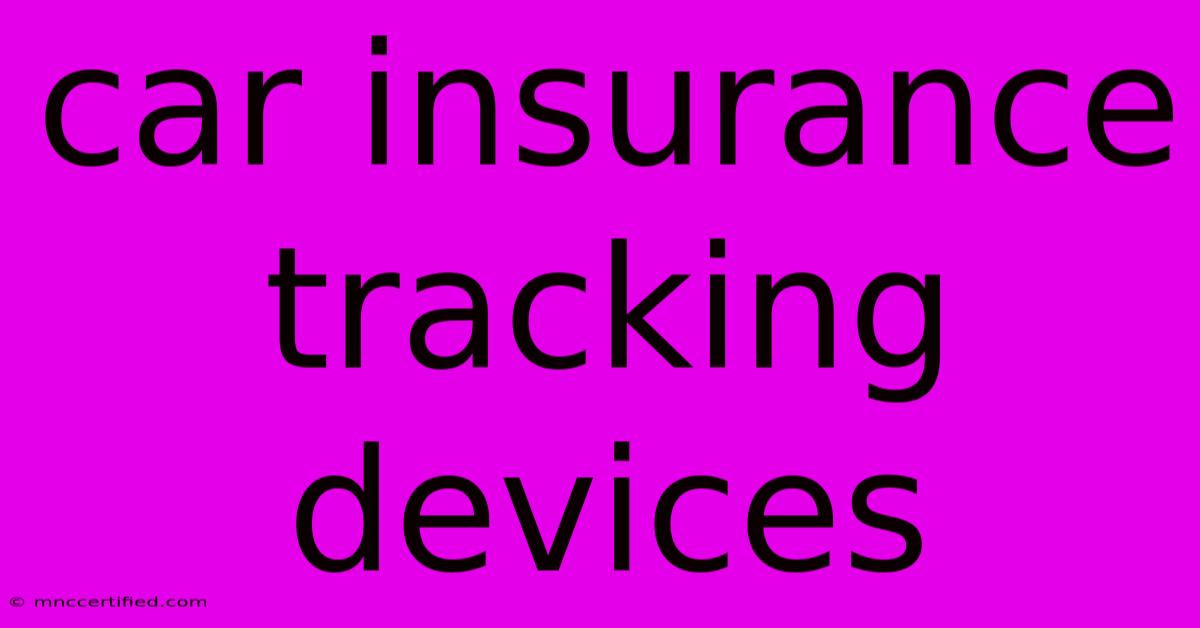Car Insurance Tracking Devices

Table of Contents
Car Insurance Tracking Devices: A Comprehensive Guide
Are you tired of high car insurance premiums? Are you looking for ways to potentially lower your costs and improve your driving habits? Consider car insurance tracking devices. These small, often GPS-enabled devices, are becoming increasingly popular as a way to demonstrate safe driving and potentially unlock significant savings on your car insurance. This comprehensive guide will explore everything you need to know about car insurance tracking devices, from how they work to their pros and cons.
How Car Insurance Tracking Devices Work
Car insurance tracking devices, also known as telematics devices, monitor your driving behavior. They typically track several key metrics, including:
- Speed: How fast you drive, and whether you frequently exceed speed limits.
- Acceleration and Braking: How harshly you accelerate and brake. Aggressive driving behaviors are often penalized.
- Mileage: The total distance you drive. This helps insurers assess risk based on usage.
- Time of Day: When you typically drive. Night driving often carries a higher risk.
- Location: While privacy concerns exist (discussed later), location data can help assess risk based on driving environment.
- Hard Braking/Acceleration Events: These are sudden, sharp braking or acceleration events that indicate risky driving behavior.
These data points are transmitted wirelessly to your insurance provider, allowing them to assess your risk profile more accurately than traditional methods. The data is usually analyzed using sophisticated algorithms to create a personalized driving score. A better driving score translates to potential discounts on your insurance premiums.
Types of Car Insurance Tracking Devices
There are several types of car insurance tracking devices available, each with its own set of features and benefits:
- Plug-in Devices: These are the simplest type, plugging directly into your car's OBD-II port (located under the dashboard). Installation is typically quick and easy.
- Hardwired Devices: These devices are professionally installed by a mechanic and are more permanently affixed to your vehicle. They often offer more comprehensive data collection.
- Smartphone Apps: Some insurance companies utilize smartphone apps to track driving behavior. These apps use your phone's GPS and sensors to collect data. This option eliminates the need for a separate device.
The best type of device for you will depend on your individual needs and preferences. Consider factors like ease of installation, data accuracy, and privacy concerns when making your decision.
Benefits of Using Car Insurance Tracking Devices
Using a car insurance tracking device offers several key benefits:
- Lower Insurance Premiums: This is the primary benefit. Safe drivers are often rewarded with significant discounts.
- Improved Driving Habits: The devices provide feedback on your driving, encouraging you to adopt safer and more fuel-efficient driving practices.
- Enhanced Safety Features: Some devices offer additional safety features, such as crash detection and emergency services notification.
- Personalized Feedback: Many programs provide detailed reports on your driving performance, helping you identify areas for improvement.
Potential Drawbacks and Concerns
While car insurance tracking devices offer many advantages, it's important to be aware of potential drawbacks:
- Privacy Concerns: The collection of data on your driving habits raises valid privacy concerns. It's crucial to carefully review the insurance company's privacy policy before agreeing to use a tracking device.
- Device Malfunction: Like any electronic device, there's a possibility of malfunction. This could lead to inaccurate data and potentially unfair penalties.
- Data Accuracy: While generally accurate, the data collected can sometimes be affected by external factors, such as GPS signal interference.
- Lack of Control: You are relinquishing some control over your driving data to your insurance provider.
Choosing the Right Car Insurance Tracking Program
Before selecting a car insurance tracking program, consider the following:
- Insurance Provider: Research different providers and compare their programs, discounts, and privacy policies.
- Device Type: Decide whether a plug-in device, hardwired device, or smartphone app best suits your needs.
- Data Collection Practices: Understand exactly what data is collected and how it is used.
- Privacy Policy: Thoroughly review the provider's privacy policy to ensure your comfort level with data handling.
- Customer Reviews: Read reviews from other users to gauge their experiences with the program and device.
Conclusion
Car insurance tracking devices offer a potentially rewarding way to lower your insurance premiums and improve your driving habits. However, it's crucial to weigh the benefits against the potential drawbacks, particularly concerning privacy. By carefully researching and selecting a reputable program, you can harness the power of telematics to save money and become a safer driver. Remember to always prioritize your privacy and read the fine print before enrolling in any program.

Thank you for visiting our website wich cover about Car Insurance Tracking Devices. We hope the information provided has been useful to you. Feel free to contact us if you have any questions or need further assistance. See you next time and dont miss to bookmark.
Featured Posts
-
Champions League Barcelona Brest Starting Xi
Nov 27, 2024
-
Nick Preston Shelter Insurance
Nov 27, 2024
-
Over 5000 Back General Election Petition
Nov 27, 2024
-
No Spy Says Uk On Expelled Diplomat
Nov 27, 2024
-
Fine Art Insurance Application
Nov 27, 2024